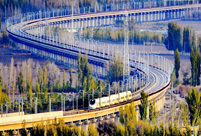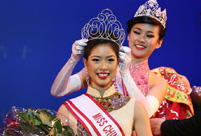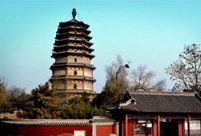

People’s Daily Online: Last year during FOCAC, Sinosure and Transnet agreed to a $2.5bn funding guarantee for Transnet in a ceremony witnessed by South African President Jacob Zuma and his Chinese counterpart Xi Jinping. What’s the thinking behind this decision?
Sinosure: Transnet is the largest and most crucial part of the freight logistics chain that delivers goods to every South African.
It is one of the largest stateowned enterprises with top ranking assets and business scale in Africa, as well as a healthy outlook.
An overall partnership is not only beneficial for the bilateral economic and trade co-operation, but also for the building up of Chinese enterprises’ reputation.
In the long run, it prepares enterprises and financial institutions to further expand the market in SA.
Take the locomotive procurement contract in March 2014 for example — the former China South Rail and the former China North Rail (the two have merged into one company named CRRC) respectively signed procurement contracts with Transnet with a total value of about $3bn.
To meet the huge financing demand of the project, Transnet had approached the China Development Bank, the ICBC, Standard Bank, Barclays South Africa and other international banks. Yet there was still a gap in funding.
Sinosure’s involvement will effectively safeguard the interests of exporters and most banks, which will assist with advancing of the project financing.
What’s more, Transnet plans to increase investment in port expansion, maintenance and the construction of railways.
We believe that the implementation of this strategy will help improve SA ’s logistics, enhance the level of industrialisation and improve the overall employment level.
China has world-leading investment and construction experience in the above fields and we will actively co-operative with the planning and implementation of such strategies. If we are fortunate enough to participate, we will spare no effort.
In conclusion, we believe that a harmonious development of economy, finance, environment and employment could be achieved with the efforts from the South African government, Parliament and society.
People’s Daily Online: Emerging economy currencies have gone into devaluation since the end of 2014. The Russian ruble, the Argentine peso and the South African rand are no exception. Major rating agencies downgraded the debt rating of SA by the end of 2015. How does Sinosure see the level of risks in SA now?
Sinosure: The rand weakened by more than 30% to the dollar and around 27% to the Chinese renminbi in 2015. The volatile exchange rate has become a prominent risk issue for Chinese companies.
We believe the rand depreciation is a sign of SA’s country risk, as it reflects its current economic and political difficulties: the economic risk exerts downward pressure on the rand while political instability disturbs the exchange rate market.
The South African Reserve Bank hiked its benchmark interest rate by 25bps to 6.25% at its November 2015 meeting amid weak growth.
The MPC hoped to ease the inflationary pressures, stablise the rand exchange rate and cushion the US rate rise impact, but it would also push the prime rate to 9.75% which will affect the consumer confidence negatively and therefore add to the pressure on the economy.
The announcement came after a 25bps increase in July.
Sinosure doesn’t cover foreign exchange risk directly in our underwriting policy but we track the exchange rate changes closely because it has significant spillover effects. Given the current economic situation, companies are facing increased risk of defaults in the future, which can turn into bankruptcies easily, as there is a growing uncertainty in SA ’s economic development prospect. For example, the continuous and rapid devaluation of the ruble since July 2014 has hiked Russian buyers’ credit risk. Sinosure received a lot of loss reports in a short period because of Russian buyers’ payment default. Sinosure adopted express claims settlement procedure immediately for the infringed companies.
The way Sinosure evaluates country risk is different from rating agencies. Sinosure gives multiple dimensions of consideration, including diplomatic ties and the political, economic, legal and commercial environment.
The three major rating agencies focused on SA’s sovereign risk or sovereign debt default risk, as well as investment return when they downgraded SA.
Sinosure examines the long-term risks at a macro level. Overall, SA has a sound legal system, a mature legal environment, a well-functioning government and a stable political situation. Moreover, SA is Africa’s most developed economy, a member of Brics and the Southern African Customs Union. All the above give SA a gateway status into the African continent, economically, politically and culturally.
Although the country is battling economic growth slowdown, a decline in commodity prices which has caused mining revenue to shrink, labour tensions and other problems, from a long-term point of view we believe that as the global economy is improving, SA has the strength to overcome difficulties and to secure promising growth prospects.
What is the officially supported export credit insurance institution?
The officially supported export credits refer to the official support provided by or on behalf of a government for export of goods and/or services, including export credit guarantee or insurance (pure cover), official financing support or any combination of the above, according to the OECD’s Arrangement On Officially Supported Export Credits 2015 Revision.
The officially supported export credit insurance agencies rely on sovereign credit, reflecting the extension of public finance through the government’s policy function.
Because of the nature of the risk in export activities, it is difficult to measure the probability of loss, which is unbearable to general commercial insurance companies; hence official ECI agencies provide ECI globally.
It’s been proven that when international economic and political risks are running high, commercial companies tend to withdraw from the credit insurance market or raise the threshold for profit reasons, while policy-based institutions which do not run for financial gains remain to be the primary protector of corporate economic interests overseas.
Therefore, official export credit insurance agencies strongly support development of foreign trade and economic co-operation in full accordance with the home country’s policy requirements by bringing into play its policy-supportive function.
(The story was originally published on Business Day on February 29th, 2016.)
 |
 China has world's largest high-speed rail network
China has world's largest high-speed rail network Top beauties in Chinese provinces
Top beauties in Chinese provinces 600 people attend Lusheng playing contest in S China
600 people attend Lusheng playing contest in S China Engineer troop builds bridge in real combat conditions
Engineer troop builds bridge in real combat conditions You can urinate in public in Chongqing
You can urinate in public in Chongqing Rice terrace scenery in southwest China's Yunnan
Rice terrace scenery in southwest China's Yunnan 2016 Miss Chinatown USA pageant held in San Francisco
2016 Miss Chinatown USA pageant held in San Francisco Ancient pagodas across China
Ancient pagodas across China Wedding dress show up in the air
Wedding dress show up in the air Top 20 hottest women in the world in 2014
Top 20 hottest women in the world in 2014 Top 10 hardest languages to learn
Top 10 hardest languages to learn 10 Chinese female stars with most beautiful faces
10 Chinese female stars with most beautiful faces China’s Top 10 Unique Bridges, Highways and Roads
China’s Top 10 Unique Bridges, Highways and Roads Harris is making waves in S.China Sea
Harris is making waves in S.China Sea With new plant, Airbus seeks to secure China market share
With new plant, Airbus seeks to secure China market share Chinese sound off on America’s loudest presidential hopeful
Chinese sound off on America’s loudest presidential hopeful 40 years after Cultural Revolution, repentance of Red Guards is still rare
40 years after Cultural Revolution, repentance of Red Guards is still rareDay|Week